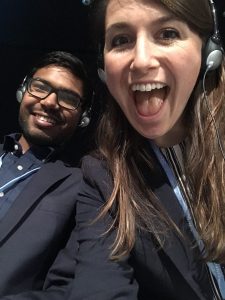
Amanda and Udit during the announcement of the 2019 Global Climate Action Summit
Amanda Ullman
Today was a day for recognition of non-state actors at COP24. With the announcement of the newly scheduled September 23rd, 2019 Climate Summit, the Secretary General of the UN took special care to announce his intention towards integration of subnational and non-state actors into discussion on mitigation and increased ambition. Particularly noteworthy was Special Advisor, Bob Orr’s, declaration of his intention to encourage high-energy users, like the cement, steel, and IT sectors, to develop stronger mitigation efforts.
The Secretary General’s sentiments were echoed by Japan in the High-Level meeting preceding the Partnership for Electromobility event. Japan referred to the “indispensable” nature of nonstate actors in the fight against climate change and announced his intention to build momentum amongst nonstate actors within the international community. Later in the Electromobility Partnership forum, which discussed the creation of an international partnership of countries focused on electric vehicle technology, Gabon called on the private sector to create innovative, affordable electric vehicle solutions and to act in accordance with the goals of the Paris Agreement.
What was lacking for me amongst this talk of nonstate actor involvement, though, was discussion from actual private sector representatives. I will be curious to see if future COP24 events will discuss specific examples of private sector plans and partnerships born out of this increased prioritization of nonstate actor involvement.
Corey Sugerik
Today was another full day of side events primarily focused on transparency and increasing ambition. One of my favorite moments from the day was during an event hosted by the German Institute for Development regarding lessons learned from the Nationally Determined Contributions. At one point the conversation turned to ambition, and the director of ICCCAD (International Centre for Climate Change and Development) made a poignant statement that one of the countries that was most prepared to adapt to climate change was Bangladesh, and the least prepared was the United States, and this is because Bangladesh takes climate change seriously. He further concluded that because developing countries have had to adapt to a changing climate for so long, despite being hit harder by climate change, they will be more prepared in adaptation.
Another observation that I made today is that during side events that have both developed and developing country representatives, the developed countries tend to talk longer with less consideration for their time limits, while the developing countries are reminded more of time constraints and given less time in general to speak. I am interested if this trend continues in other sessions, or it was a few instances.
Cai May Tan
Day 3 of COP 24 has come and gone. Subsidiary bodies meetings and negotiations are already well underway, in the race to cover technically-focused negotiations in the first week of COP. Prior to my trip, I already decided to track adaptation negotiations after completing a topic presentation for this course. Using this Climate Tracker cheat sheet, I formulated my agenda for the rest based on what agenda items that were up for discussion. Today, I sat in as an observer to four informal consultations sessions and took extensive notes on the different considerations of Parties. It was interesting to see the banter between different party blocs, as most disagreements were between developed and developing nations, which were per my expectations. The majority of issues that were raised during the negotiations had to do with increasing efficiency and clarity of vocabulary, and slight disagreements (but not completely antagonistic) over interpretations. However, I was not sitting in on contentious discussions. Most agenda items discussed were quick fixes to be completed in the first half of the week. More drafts and proposals are expected in the days leading up to Friday, before the second round of High Level Segment discussions begin next week. I am excited to follow up on the developments made during sessions on implementing adaptation fund, adaptation communications, and adaptation committee under the Paris Agreement.

IPCC Chair Hoesung Lee discusses the 1.5ºC Special Report
Udit Gupta
Today, the Standing Committee on Finance (SCF) held an event on its recently released Biennial Assessment Report. It patted itself on the back for the increase in climate finance flows. Noticeably absent from the discussion was the criticism of inconsistent definitions of climate and green finance. The SCF members emphasized the importance of a broader vision over restrictive definitions.
At the IPCC event today, I was incredibly impressed with IPCC’s ability to convey complex modeling results and uncertainty effectively to a non-scientific audience. Lead authors of the IPCC 1.5ºC Special Report informed the delegates of the somber findings in their recently released report. Jim Skea, one of the co-authors, communicated without hesitation that national ambitions as laid out in NDCs were not large enough to restrict warming to 1.5ºC – a goal to be strived under the Paris Agreement. Interestingly, the IPCC report was released a month before the COP. Deborah Roberts, another co-author of IPCC report, emphasized their study on synergies between adaptation and mitigation efforts.
Paelina DeStephano
Today was full of side events for me as I supported Stockholm Environment Institute in publicizing some of their events. My favorite session of the day was on economic diversification. With all the focus this year on just transitions, there’s been a lot of talk about green jobs and economic transitions for fossil fuel dependent states. There was a panelist from the International Renewable Energy Agency who made a strong case for the potential of renewable jobs. Her agency is trying to identify overlapping skills and regions to map out areas where governments can support fossil fuel workers in a carbon constrained world. This conference has been a fascinating look into how NGOs can deploy research to strengthen the case for decarbonization.